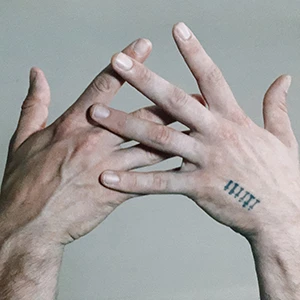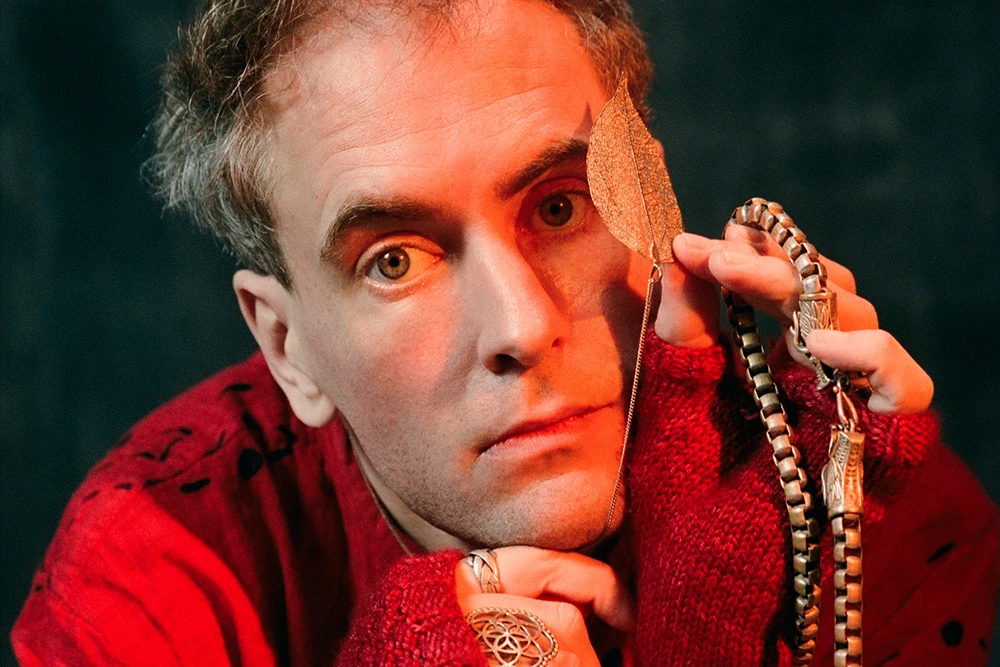
As much as jazz saxophonist Alabaster Deplume’s record documents his journey towards relief, it encourages others to seek their own. A Blade is also a salve.
 A Blade Because a Blade Is Whole Alabaster Deplume International Anthem 7 March 2025
A Blade Because a Blade Is Whole Alabaster Deplume International Anthem 7 March 2025
Leading up to his seventh studio album, Angus Fairbairn, better known as Alabaster Deplume, recorded an EP in Palestine with two local musicians: pianist Sami El Enani and Qanoun player Laith Albandak. The EP was created in solidarity with the Palestinian people while he completed an artist residency in Bethlehem. The jazz saxophonist ends with a piece based on the poem “If I Must Die”, which was written by Refaat Alareer, a Palestinian professor who was killed in an Israeli airstrike.
The jazz saxophonist, poet, and activist has always supported disadvantaged people, beginning with his early charity work with people with disabilities. He has even been active in environmental protests. His compulsion to help others compels the English musician to ask, “What do you need?” More often than not, those receiving the question had a common answer: healing.

Deplume‘s latest release, A Blade Because a Blade Is Whole, aims to do just that. However, instead of looking outward, Fairbairn looks within, focusing on healing the self before healing others. But as much as the record is a document of his journey towards relief, it encourages others to seek their own. A Blade is also a salve.
While working on the record, Fairbairn faced big emotions with writing, reading, reflecting, and practicing Jiu Jitsu. He wrote a book of poetry called Looking for my value: prologue to a blade, which ponders the paradox of a blade: “The blade, that divides, is whole,” he explains in the book’s introduction. “Healing is forming a whole, and a whole is singular, more itself, as in more one, as in more alone.” Some of the book’s meditations became the album’s lyrics and spoken-word sections.
“Oh My Actual Days” opens the album with a melody that sounds derived from Thelonious Monk‘s “‘Round Midnight”, at least with the first interval jumps. The foreboding drums lead into piano, strings, guitar, and saxophone as the composition takes on a transcendental quality, a celestial atmosphere reminiscent of another jazz giant and his seminal work, John Coltrane and A Love Supreme. It’s somber, mystical, and cosmic; it breathes with a crescendo and extravagant dynamics, radiant with spiritual jazz sparkle.
In “Thank You My Pain”, Alabaster Deplume meditates on the teachings of Thich Nhat Hanh, a Buddhist monk considered “the father of mindfulness”. Guided by the monk’s credo: “Hello, my little pain, I know you are there, I am home to take care of you,” Fairbairn soothes suffering and afflictions by welcoming negative emotions without judgment. Underneath a slithery groove, Fairbairn repeats the song’s title. At some point, he ponders agency in relation to social media: “When I myself am away in ideas or DMS, notifications, disappeared, just a name in a space, where a self who could say, ‘I am here!’”
“Invincibility”, with its acoustic guitar, swelling strings, and gentle singing, builds like orchestral folk. “Form a V” is based on jiu-jitsu and the shape its practitioners form within their dojo. It’s another slow melody that slinks along, the echoy snare evoking dubstep. “A Paper Man” also has a dubstep flavor in the bass and drum groove. The aimless instrumental mist evolves into a kind of noir jamming not unlike something from the Mars Volta‘s Frances the Mute. Fairbairn’s saxophone technique is displayed on “Who Are You Telling, Gus”. Its thick vibrato makes his haunting melody sound like a violin—more Volta-esque jamming.
“Prayer For My Sovereign Dignity” features a slow, solemn melody that shimmers similarly to the opening track. The melody loops around itself, a repeated pattern, like a meditation. “Salty Road Dogs Anthem” sounds science-fictiony with beeping and whirring like an alien aircraft or intercepting radio signals. It settles into a back-and-forth groove with an improvising saxophone over the top. “Too True” is a dark, ominous guitar and vocal track resembling Mount Eerie or Xiu Xiu. Fairbairn’s low, whispering voice lets go of grief.
“That Was My Garden” has one of the most potent melodies and memorable lyrics. Its extension of time feels familiar, from a previous melody. In the lyrics, Fairbairn doesn’t express anger towards those who have hurt him. Instead, it’s a moment to reflect on himself, recognizing the importance of boundaries: “That was not a car park, that was my garden.” Incredible dynamics of the band are showcased here, building and residing like waves lapping the sand.
A Blade Because a Blade is Whole is a meditative work; its messages are intended to guide its author through the turmoil of human consciousness. It’s an introspective album less concerned with neatly categorizing music or a listener’s opinion. The talented and eccentric English jazz musician has produced a body of work for the purpose of self-actualization.
Its listeners are mere accessories, fortunate to be let into Alabaster Deplume’s healing process that yields an incredibly rich listening experience, whose familiarity leads to their own realizations and a cumulative appreciation for the artist’s openness. Fairbairn knows the road to healing is challenging, but perhaps, listeners will find their own courage with A Blade.


